With almost four decades of roles across nearly every genre, Power Book II: Ghost star Larenz Tate spoke with Boardroom about the evolution of the Black male protagonist and the keys to reinvention and longevity in Hollywood
When you think of television and film thespians who have been mainstays in the industry across generations — Black, white, Asian, queer, straight, or any intersectional identity in between — the list is short. But when you narrow it to Black actors who have conquered romance, drama, suspense, comedy, and countless other genres since the age of 10 in some of the culture’s staple works, you have to say the name Larenz Tate.

From his role as Quincy Jones alongside Jamie Foxx in Ray to his recurring role as Power‘s Councilman Tate, he has proven his talent, adaptability, and versatility since 1985 — and doesn’t show any sign of letting up.
“I admire his consistency and versatility,” Jeff Johnson, host of the podcast Power After Hours, told Boardroom.
As Johnson listed off Tate’s roles over the years — aspiring poet, legendary music executive, ruthless gangster, shady politician, and more — he praised the actor for his adaptability and ability to create and connect throughout his career.
“He adapts with the times,” Johnson said. “I appreciate any artist who will challenge themselves to step out of their comfort zones to develop new skills and reach higher heights. Larenz has held a special place within the Black culture zeitgeist over his career because he consistently delivers in his performances with a natural authenticity and how he connects with audiences. Whether you’re rooting for his character to win or lose, you know you’re gonna feel something real.”
With his first introduction to Tate being Menace II Society, Johnson praised the actor’s portrayal of O-Dog as one of the most memorable characters in Black cinematic culture to date.
“I couldn’t imagine how someone could play a dude who was so cold,” Johnson said.
“From the glimpses I caught as a child, I knew Tate was one of them ones,” he added. “Then when he transformed into the lyric kickin’ brother in Love Jones? Tate and Nia Long’s performances would’ve had social media in a chokehold if it existed in those times. For me, those two roles cemented Larenz in the Pantheon of 90s Black actors.”
As for Tate himself, Boardroom got ahold of him over the phone from his Los Angeles home base. In that conversation, he described his career journey in one word: marathon. Because of his ever-evolving craft, Tate believes that he’s still on the path to where he wants to be in life.
“It’s been fueling quite long,” he said with a laugh. “And that journey has been really rewarding at the end of the day because I’ve learned so much about life. I’ve learned so much about myself. I’ve learned that being a student of life is what it’s really about and when you see it from that prism of being a student of life, you never stay in one place. You’re never stagnant.”
Tate views everything as an opportunity to learn and grow as an artist, man, and human.
“There’s been things when it’s feeling as though some things aren’t moving in the direction that I want to but at the end of the day, I know that I’m still on this journey and I have a purpose and I’m in the service business,” he said. “I wanna continue to grow as an artist, but also as a businessman.”
The Power of Power
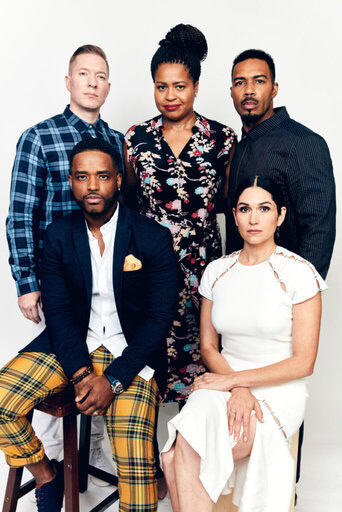
While the Curtis Jackson-created Power saga has taken on a life of its own since its 2014 debut, Ghost has become one of the more popular franchises of the four books in the series, starring Michael Rainey, Jr., Paige Hurd, Joseph Sikora, and of course, Larenz Tate.
In addition to having a personal relationship with Ghost himself, known off-camera as Omari Hardwick, Tate was a fan of Power before joining the cast. While the two diddled around with the idea of Tate coming in as James St. Patrick’s family member due to the “solid brotherhood” that the two already established in real life, things worked out differently than the two initially imagined.
After connecting with Power producer 50 Cent and creator Courtney Kemp about weaving Tate into the show, the bunch later agreed to cast Tate as Terry Silver, the lawyer who represented Ghost during his time in jail. Unfortunately, due to a prior commitment to produce a film alongside his brothers Lahmard and LaRon, Tate was unable to commit to that role. It eventually went to Brandon Victor Dixon.
In an effort to keep the connection alive, Tate reached out to Kemp to express his interest in making an appearance during the show’s fourth season. Completely unplanned and aligned with one another, Kemp mentioned that there was a role open for a “charismatic politician” for a four-episode stint, if Tate was interested. Coincidentally, the character shared a last name with its future portrayer.
While his management team and agent were hesitant at first and thrown off about Tate accepting the role without a heads up, he explained to Kemp that because the show was dripping with “Black excellence,” Tate didn’t need permission from outside parties to validate his decision to join the Power cast.
“[Kemp] said to me a lot of A-list actors try to be on the show for whatever reason [and] they tend to turn roles down, or they shy away from the TV show at the time because Starz was a small network, and it was a predominantly Black show,” Tate explained. “A lot of times [with] these A-list actors, their rep would tell them not to do the show because it did not have the stamp of approval from the likes of the Hollywood decision makers. It wasn’t the show to be on and I totally disagreed.”
Putting his foot down on the decision to join the Power family, he illustrated that agents and managers “don’t make up my mind for me.” Tate made his debut as what became one of the major antagonists in the Power universe, Councilman Rashad Tate.
“I look up [and] four episodes turns into a series regular, and there was conversations of even doing a TV show about that character [that] didn’t work itself out,” Tate said. “But [I] was so very happy that I made the decision to reach out and communicate, to work with Courtney, to work with 50 Cent and to work with Omari Hardwick.”
As they say, the rest is history.
“Rashad Tate looms throughout Ghost as a constant reminder of how one person’s systemic injustice is another person’s business savvy,” Johnson explained. “Tate uses his background as a cop and his minority status — two juxtaposed polar opposites on the power dynamic wheel — to bolster his political aspirations.”
Johnson continued to explain how Councilman Tate forces the audience to hold a mirror up to the other characters who hide behind the run-of-the-mill morals of family, friendship, loyalty and love, while Tate “unabashedly claims it.”
“He uses the system and IS the system at the same damn time,” Johnson added. “Tate works with and double crosses whoever he needs to if it means collecting more campaign donations or rocketing up the voter polls. Tate’s character reminds viewers of the many ways folks can rationalize system manipulation for personal benefit, and makes us reconsider the villains on the show based on the totality of their actions, and the circumstances which led them to those choices.”
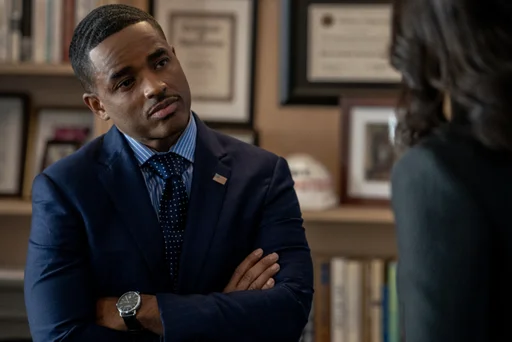
Thankful for his connection to Kemp and 50 Cent, Tate says that his relationship with the two allows his network to expand beyond his core demographic while keeping his name in the mouths of top decision makers in the industry.
“It keeps my name relevant,” he said. “This show has been a huge impact, not only on the culture, but also in Hollywood and for so many of us who want to do quality work. Sometimes it doesn’t feel like there’s great projects out there. Certainly the Power universe represents quality at a high level. They’re not cutting corners in any way.”
From the writing and direction to the culture of the cast, Tate said that the home of Power “takes care of us” and reminds him that it feels “nice to be celebrated in a way that you don’t typically see.”
Doubling down on his marathon career journey, Tate added that his role as Councilman Tate gave him the opportunity to reconnect with the audiences who have been following him since the beginning — the core Black community. While he has been part of other projects that have allowed him to spread his wings across different demographic horizons, Tate recognizes the power of his Black community who know him from cultural classics such as Why Do Fools Fall In Love?, Waist Deep, and Love Come Down.
“It’s really [allowed] me to open up to new audiences, in terms of generation,” Tate said. “So for those who’ve been supporting me for since the beginning, now their children know who I am in real time, as opposed to movies that they’ve seen in the past. That culture is so important because it’s thriving and that culture and that audience is what keeps our show alive. It has allowed me to take more chances being able to do something totally different — playing a politician. It’s been quite the journey and I’m still, again, learning more and more about myself and the characters that I play.”
House of Larenz Tate
If you’re an older millennial or younger Gen X’er, you were either crooning over Larenz Tate in Love Jones or rooting for him in Menace II Society. It’s possible you lost your mind when you saw him in the star-studded Girls Trip movie as Regina Hall’s guitar-strumming love interest. Now, you probably can’t turn away whenever Councilman Tate opens his mouth.
“I never allowed myself to get caught in a box,” he said. “If you think about it, I don’t really do the same kind of projects. I kind of change it up. You can look at things from my early career and then going to movies like Crash, The Inkwell and Dead Presidents.
“I’ve always tried to do something to mix it up, and it kind of reflects the same thing. In terms of TV, I’ve worked on House of Lies with Don Cheadle, I played a fireman with Denis Leary in Rescue Me, and I worked on that show for like five seasons. I’m always looking to mix it up because that’s the thing that sort of inspires me to continue to do what I’m doing, because I can play different people at different times in different eras. I can kind of get lost in those roles, and it doesn’t feel mundane.”
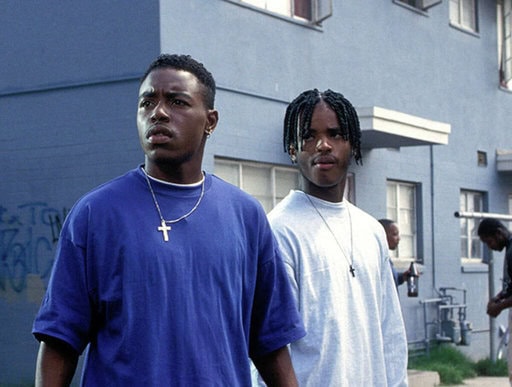
For Tate, willingness and open-mindedness are the keys to his longevity.
“Be willing to learn, be willing to take chances, be willing to find the things that still inspire you,” he said.
Though it’s not uncommon for an artist to get stuck in a rut and feel uninspired during times of doubt or stagnancy, Tate encourages creatives to keep pushing forward to activate the spark, hunger, and drive that they first had at the start of their careers. Trying new things and never settling down with satisfaction are the main ingredients to being a mainstay in the industry, according to Tate. Especially if you think that there could be more out there for you.
“If I feel like I’ve done everything,” he said. “Where else is there to go? I’m sure there’s a lot more for me to do and we’re seeing it now.”
The Younger Years
Starting his career at just 10 years old with his television debut on The Twilight Zone in 1985, Tate reflected on his nearly four-decade-long career.
“It still feels good to me,” he said. “And I’m grateful that people find me as valuable and want to continue to see me light up the screen and do what I do best. I’m very grateful for those who continue to regard me at a high level, and those who want to continue to work with me and for also the audiences who support what I do.”
Defeating the child star curse, Tate has managed to remain level-headed, humble, and hungry at 47 years old, noting that since his pre-teens he had experienced “pitfalls,” “hurdles,” and “landmines.” He relied on his family and loved ones to keep him grounded through the ups and downs of navigating entertainment at a young age. With his loving parents Peggy and Larry Tate by his side, Tate demonstrated undeniable maturity by the age of 16 and was then trusted to make career decisions all his own.
By the time Tate was 18, he was off to Los Angeles on his own with the support of his two older brothers, who were also pursuing acting careers and later became his business partners. They’ve been integral in keeping Tate on his path.
“That family structure has been a huge key in me being able to have longevity, but also I think a sense of who I really am,” he said. “My parents always said, ‘stay grounded. Don’t get caught up in a hoopla. The characters that you play aren’t real people; these are just pieces of who you are, but these people don’t really define you. You’re not really O-Dog, you’re not really Darius Lovehall.'”

Being able to occasionally return to his roots in Chicago provides a sense of comfort and grounding away from California.
“That’s why I always represent Chicago because the people of Chicago have always embraced myself as well as my brothers in a way that you don’t get,” he said.
“It’s a very authentic, genuine way that we are connected to the city and the people. There’s this authenticity of just blue collar work grinded out, and everything is gonna be all right. It’s a hustle no matter what.”
Another way he remains grounded is by surrounding himself with like-minded people, mentors, and individuals who champion his success. Throughout his multitude of projects, Tate has been granted access to a slew of networks across the hundreds of thousands of actors that he has collaborated with since his acting debut. He has continued to foster those relationships as he’s climbed the ladder of success.
In fact, one of the major pieces of advice that he still carries with him was from actor Redd Foxx during their time together on Eddie Murphy’s 1991 produced television series The Royal Family.
“One thing that [Foxx] always would tell me was [to] go where you’re celebrated, not tolerated,” Tate said. “What he means by that: Work with people who really celebrate you. Work with those people who really value you and be sure to be a part of telling your version of the story.”
When reminiscing on his time as Curtis Royal in the show, he wished that he could “speak up,” which he encourages young artists and actors to do in their careers. Tate remembered feeling a sense of discomfort as the dialogue between the characters was not aligning with the demographic of a Black family, mainly because it was written from an opposite point of view.
“A middle-aged white guy was writing this dialogue and it just wasn’t right,” he said.
“We’ve been marginalized for a long time, and we have to break those barriers by telling our own stories. Being part of the decision committee being a part of the narrative is imperative. I always tell people, Black folks, we’re not asking for handouts. We’ve earned our place in this industry and we’ve earned our place in so many different industries, and we are big consumers. We consume it all. We’ve created a lot of things we don’t get the credit for.”
Foxx encouraged Tate to stay authentic and speak up when he didn’t feel heard, which is advice that Foxx wished he would’ve taken himself during the earlier years of his career.

“He says that’s what he had to do in his whole entire career and and that was one of the things that I always kept with me, so no matter what role I would play, I would try to put my own little touch on it,” Tate said. “Whether it was Menace II Society, whether it was Dead Presidents, or whether it was me doing the role in Crash, allow yourself to always have your voice heard. You don’t have to be boastful and shouting, but just your authentic voice for the characters that you play. If it doesn’t feel right, you need to speak up about it. I think when people watch my work, they can see there’s some something genuine. I just want something genuine to come across.”
Why The Industry Keeps Falling In Love
Tate said his most challenging role was one of his most notable.
“Outta all the projects that was most challenging, I would say it was Why Do Fools Fall in Love?, the story of Frankie Lymon,” he said.
Tate singled out this role, alongside Halle Berry, Vivica A. Fox, and Lela Rochon, because of the adaptability and versatility necessary to represent the R&B rockstar at three different chapters throughout his life.
“I had to sort of teleport back to the fifties, play this young kid over a period of time from the time he was 15 until the time he had passed away at 26 over a heroin overdose. He was married to three different women at three different times in his life; three very crucial points in his life,” Tate said.
In order to “capture the essence” of Lymon, Tate went above and beyond, studying his subject’s life and watching his performances and TV appearances as the frontman of Frankie Lymon & the Teenagers.
“His movement, the physicality of everything, the dancing, the singing, all of it was something that I hadn’t done before and I wanted to be, once again, as authentic as I possibly could be. Also, I had three different leading ladies,” Tate said.
“I’m looking to do so much in one movie and it almost was like three different movies in one so it was pretty taxing. I worked every day — I had to move from one era to the next. I had to do with different hair changes, costume changes, wardrobe, I would have to play 15 in the morning and then play 22 in the evening. He’s going through a drug overdose in one part of the day that I’m filming. Then the next day, he’s this happy go-lucky kid. Emotionally, it was pretty challenging, but I felt like the work came off quite nicely and definitely was one of the toughest things I had to do.”
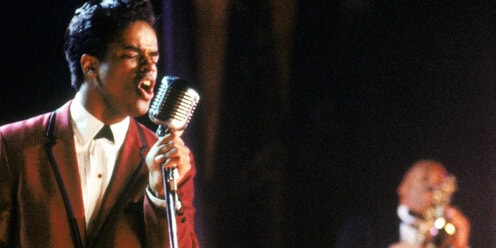
Tate also noted the importance of telling Lymon’s unsung story, where Little Richard also made an appearance as himself. With the actor only 23 years old at the time of its debut, Why Do Fools Fall in Love? would unknowingly become a story that would hold a place in Black culture and cinema across generations, demonstrating Tate’s wide range of skill on-camera.
While paying homage to Kemp and other notable storytellers in entertainment including Shonda Rhimes, Kenya Barris, Ryan Coogler, and Jordan Peele, Tate gave flowers to each for creating space for Black stories to be told across television, film, and entertainment at-large. Without these major players, the actor emphasized, there wouldn’t be an evolution of marginalized voices being heard throughout the industry. In addition to telling Black stories and amplifying voices, Black showrunners, producers, and content creators today are demonstrating that those stories have global appeal.
“I think it is really imperative and necessary for Black folk to tell our stories because historically, our stories have been told from the point of view of people who are not Black, so it’s very subjective,” Tate said. “It’s their version of our experience as opposed to the people who actually live this, and what better people to tell our story than us? I think there has been so much that we have been able to prove to the powers that be, because most of the powers that be don’t look like us. They don’t share the same experiences.”
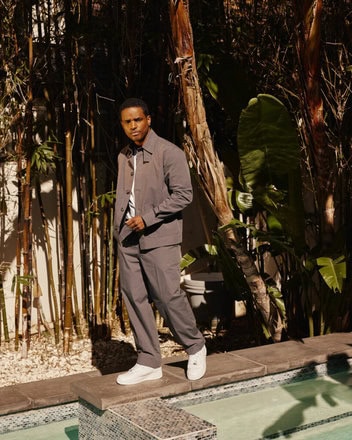
Noting that Black folks aren’t historically in positions of power as executives who run studios and networks, Tate has seen the changes in the entertainment ecosystem where Black folks are becoming power players and decision makers.
He continued: “There’s very few of us in those positions, but things are changing. I think it’s necessary to change because once Hollywood begins to really have inclusion and diversity, it goes to show how the world really looks and how the world really functions. Not just a group of people who make the decisions over everyone else. Now that’s changing and we can’t go backwards.”
Bringing our conversation full-circle, Tate spoke about his legacy. After diving into his past, he considered how he wanted to be remembered.
“I would love for people to know that I was a person of integrity,” Tate said. “I cared about what I did as an artist, and I wanted to continue to break down the barriers for people who’ve been marginalized, specifically Black folks, and show that we are multifaceted and we’re multi-dimensional and we’re some of the most beautiful people that’s ever been created. I want to continue to represent that and represent longevity and my legacy to be like I ran the marathon and not the sprint.”